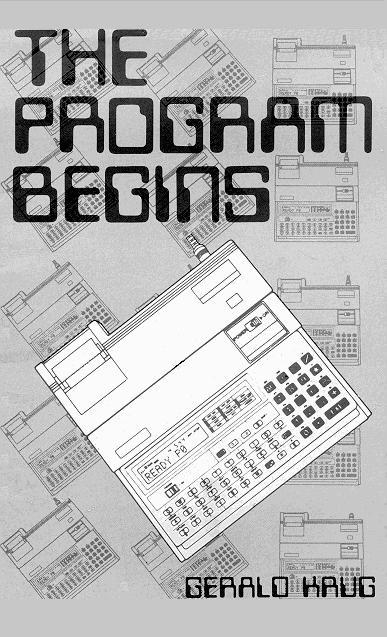
"The Program Begins,Over 50 Programs on the Trs-80, Pc-4 Pocket computer."
Casio POCKETPC BASIC interpreter. (more info. below)

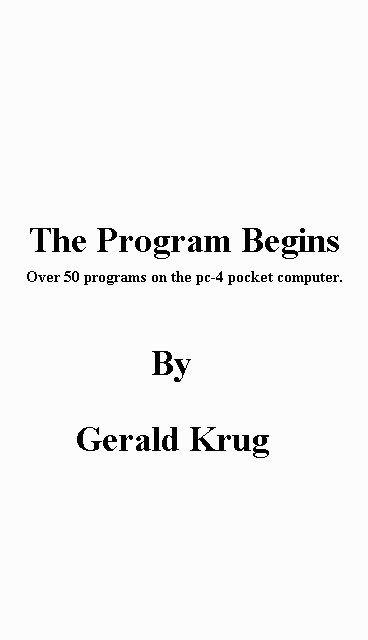
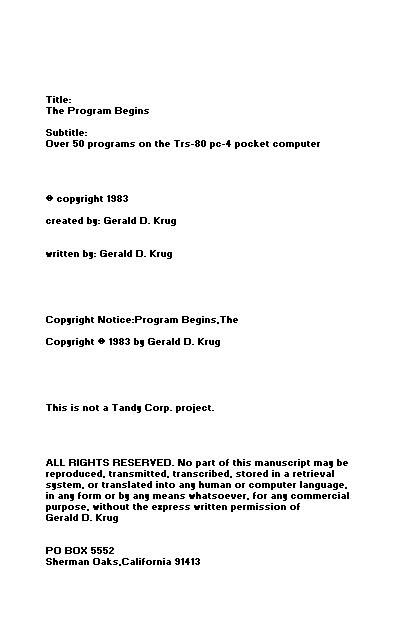
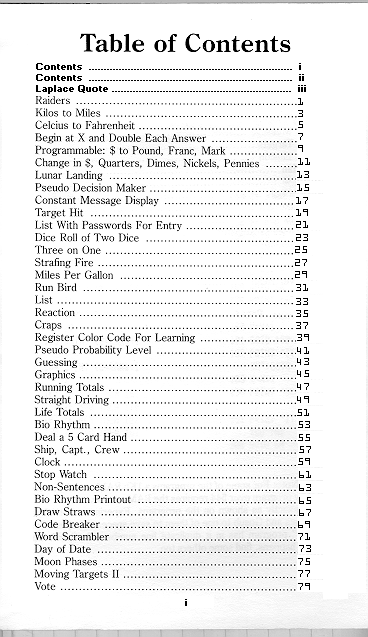
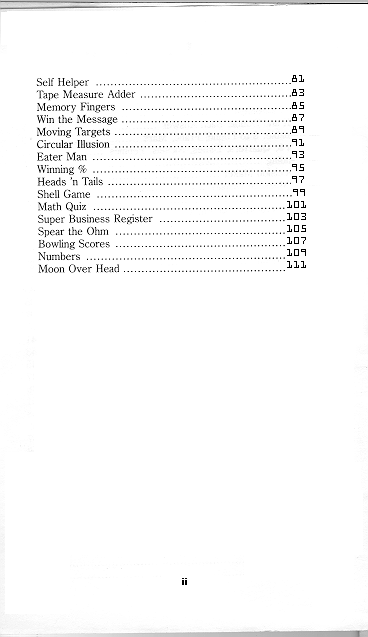 Table Of Contents
Contents
Page i
Contents
Page ii
Laplace Quote
Page iii
Raiders
Page 1
Kilos to Miles
Page 3
Celcius to Fahrenheit
Page 5
Begin x and double
Page 7
Program: $ to pound franc mark
Page 9
Change in $
Page 11
Lunar Landing
Page 13
Psuedo Decisions
Page 15
Constant message
Page 17
Target Hit
Page 19
List With Password
Page 21
Dice Roll of Two Dice
Page 23
Three On One
Page 25
Strafing Fire
Page 27
Miles Per Gallon
Page 29
Run Bird
Page 31
List
Page 33
Reaction
Page 35
Craps
Page 37
Register Color Code
Page 39
Psuedo Probability
Page 41
Guessing
Page 43
Graphics
Page 45
Running Totals
Page 47
Straight Driving
Page 49
Life Totals
Page 51
Bio Rhythm
Page 53
Deal Out Five Card
Page 55
Ship Capt Crew
Page 57
Clock
Page 59
Stop Watch
Page 61
Non-Sentences
Page 63
Bio Rhythm Printout
Page 65
Draw Straws
Page 67
Code Breaker
Page 69
Word Scrambler
Page 71
Day Of Date
Page 73
Moon Phases
Page 75
Moving Targets II
Page 77
Vote
Page 79
Contents
Page ii
Self Helper
Page 81
Tape Measure
Page 83
Memory Fingers
Page 85
Win The Message
Page 87
Moving Targets
Page 89
Circular Illusion
Page 91
Eater Man
Page 93
Winning %
Page 95
Heads And Tails
Page 97
Shell Game
Page 99
Math Quiz
Page 101
Super Biz Register
Page 103
Spear the Ohm
Page 105
Bowling Scores
Page 107
Numbers
Page 109
Moon Over Head
Page 111
Given for one instant an intelligence
which could comprehend all the forces
by which nature is animated and the
respective positions of the beings which
compose it, if moreover this intelligence
were vast enough to submit these data
to analysis, it would embrace in the same
formula both the movements of the largest
bodies in the universe and those of the
lightest atom; to it nothing would be
uncertain, and the future as the past
would be present to its eye.
Pierre-Simon Laplace
See text version
Table Of Contents
Contents
Page i
Contents
Page ii
Laplace Quote
Page iii
Raiders
Page 1
Kilos to Miles
Page 3
Celcius to Fahrenheit
Page 5
Begin x and double
Page 7
Program: $ to pound franc mark
Page 9
Change in $
Page 11
Lunar Landing
Page 13
Psuedo Decisions
Page 15
Constant message
Page 17
Target Hit
Page 19
List With Password
Page 21
Dice Roll of Two Dice
Page 23
Three On One
Page 25
Strafing Fire
Page 27
Miles Per Gallon
Page 29
Run Bird
Page 31
List
Page 33
Reaction
Page 35
Craps
Page 37
Register Color Code
Page 39
Psuedo Probability
Page 41
Guessing
Page 43
Graphics
Page 45
Running Totals
Page 47
Straight Driving
Page 49
Life Totals
Page 51
Bio Rhythm
Page 53
Deal Out Five Card
Page 55
Ship Capt Crew
Page 57
Clock
Page 59
Stop Watch
Page 61
Non-Sentences
Page 63
Bio Rhythm Printout
Page 65
Draw Straws
Page 67
Code Breaker
Page 69
Word Scrambler
Page 71
Day Of Date
Page 73
Moon Phases
Page 75
Moving Targets II
Page 77
Vote
Page 79
Contents
Page ii
Self Helper
Page 81
Tape Measure
Page 83
Memory Fingers
Page 85
Win The Message
Page 87
Moving Targets
Page 89
Circular Illusion
Page 91
Eater Man
Page 93
Winning %
Page 95
Heads And Tails
Page 97
Shell Game
Page 99
Math Quiz
Page 101
Super Biz Register
Page 103
Spear the Ohm
Page 105
Bowling Scores
Page 107
Numbers
Page 109
Moon Over Head
Page 111
Given for one instant an intelligence
which could comprehend all the forces
by which nature is animated and the
respective positions of the beings which
compose it, if moreover this intelligence
were vast enough to submit these data
to analysis, it would embrace in the same
formula both the movements of the largest
bodies in the universe and those of the
lightest atom; to it nothing would be
uncertain, and the future as the past
would be present to its eye.
Pierre-Simon Laplace
See text version
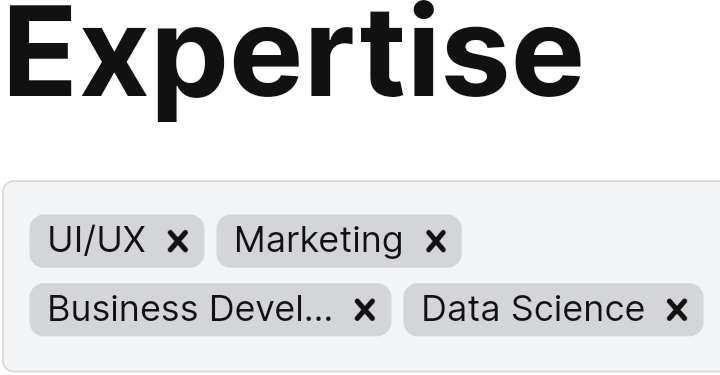
Now in Google EPUB format
Get from Google Books
To Copyright your computer programs go to
To see what I have in ourmedia.org
See 56 programs GDKPB1.gif through GDKPB56.gif
2nd page to programs 16,36,38,45,52 GDKPB16B.gif GDKPB36B.gif GDKPB38B.gif GDKPB45B.gif GDKPB52B.gif
Front and back covers GDKPBF.gif GDKPBB.gif
Trs-80 Pc-4, Copyright 1983,1987,2006 ISBN 10:0961289007 ISBN 13:978-0-9612890-0-3 LCCN 90-111394
Dewey Decimal call# 510.78 T793K 1987
LC CALL NUM. QA76.8.T793 K78 1987
QA Science,Mathematics, Computer Science 768 Computer software T793 T391-995 Exhibitions. Trade shows. World's fairs K78 Authors last name 1987 Year Published ISBN stands for International Standard Book Number. ISBN type is based on EAN-13. Previously, all ISBN were in EAN-10 format. EAN-13 and ISBN 13 uses the same encoding but may contain different data in the ISBN number (Drop the first 0 and last 4 of 0-09612890070-4 to encode for UPC-A)
Search www.Amazon.com. Click to submit the ISBN number in the search form below,you'll find "The Program Begins",subtitled,"Over 50 programs on the Trs-80,Pc-4 Pocket Computer".
NEW...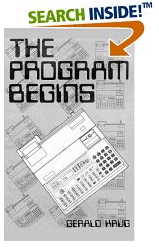
Customers LOVE dealing with us...
TRS-80 MODEL PC-4 POCKET COMPUTER 1983
The 260-3650 was discontinued in 1986. The owner's manual and
programming information may be obtained from our order center at
1-800-241-8742. This unit is not available in any of the formats that
you requested.
(260-3650) SPECIFICATIONS
������������������������������������������������������������������������
CAPACITY: 10 program areas(P0 to P9)MEMORY 26(max.222)1.5kb expand 94
LANGUAGE: BASIC ready-mode0 shift0 BATTERY LIFE: 360 hours (approx.)
CONSUMPTION: 0.02 watts DIMENSIONS: 3/8 x 6 1/2 x 2 3/4"
WEIGHT: 4.1 oz. (including batteries)
������������������������������������������������������������������������
Tandy Product Support Center
CJW
Consider buying "The Program Begins" at \\$19.95 instead of costly future downloads If you have copyrighted software under 10k,GDK would be interested in "appletting" your programs in Java and Brew.
"The Program Begins" can be made into XML tags by using Mathml 2.0.
GDK would also like to purchase rights to reprint your
copyrighted software as downloads from the internet and other media.Content isn't going to be free once the world is converted
to the Infohiway so let GDK market your content NOW!
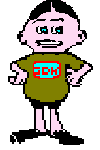
Learn The Basic Computer language in a crash course online from GDK.
The following are summaries of the information on your
titles' catalog pages. Please check to ensure the title, ISBN/UPC, pricing
are correct:
Book
ISBN: 0961289007
Title: The Program Begins,Over 50 Programs on the Trs-80, Pc-4 Pocket
Computer
Author: Gerald D. Krug
Publisher: Norman Book Distribution Co
Publication date: 11/01/1983
Pages: 111
Binding: library
Description: The author,geraldkrug@hotmail.com,March 19,2000 Reviewer: The
author, Gerald D. Krug "It helps to see a large collection of basic programs
when learning to program computers.This collection has 56 Basic programs I
know you will always use. You will be able to see how all complex software
is created by these simple algorithms. Have fun" Gerald D. Krug
Author biography: Born 1958,Chula Vista,San Diego,California. Began investing
in computer programs in 1979 and wrote the code to 56,basic language,
computer programs published in the book "The Program Begins".Written in an office in the Taft building on Hollywood and Vine and edited on Barham blvd. in Universal City.
Currently developing those programs for the bio-net and convergence.
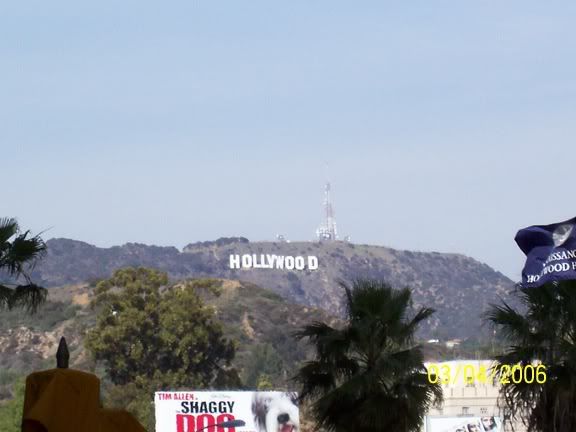
My office was between Miles, Vera TV 1652 Vine Street & Audrey Hepburn, MP 1652 Vine Street
Who you gonna Program?
Check out the PC-4 the "Ghost-Buster" is wearing..............................................................................↑
Review 1: see back cover of "The Program Begins"
Review 1 source: Publisher
Relationship to the item: Author
Suggested Retail Price: \\$19.95
Amazon.com will pay you \\$8.98 for each copy sold.

Screen Of "Eater man" program
10 PRINT "Your aboard the Lunar Lander about to leave the spacecraft."
20 print "To just coast without burning fuel enter .01"
70 goto 1010
80 goto 2010
90 goto 3005
100 H = H - V
110 V = ((V + G) * 10 - U * 2) / 10
120 F = F - U
130 IF H > 0 THEN goto 80
135 H = 0
140 goto 2010
150 print "Velocity less than 5 your a-ok! else you crashed."
170 goto 5000
180 GOTO 10
1010 V = 70
1020 F = 500
1030 H = 1000
1040 G = 2
1050 goto 80
2010 PRINT " Meter readings"
2015 PRINT " --------------"
2020 PRINT "Fuel (gal):"
2030 PRINT F
2040 goto 2100
2045 print " "
2050 PRINT V
2060 PRINT "Height (m):"
2070 PRINT H
2075 IF H=0 then goto 150
2080 goto 90
2100 PRINT "Landing velocity (m/sec):"
2110 goto 2045
3005 IF F = 0 THEN goto 3070
3010 PRINT "How much fuel will you use?"
3020 INPUT U
3025 IF U < 0 THEN goto 3090
3030 IF U < F THEN goto 3060
3040 PRINT "Sorry, you have not got that much fuel!"
3050 GOTO 3010
3060 goto 100
3070 U = 0
3080 goto 150
3090 PRINT "No cheating please! Fuel must be >= 0."
3100 GOTO 3010
5000 PRINT "Do you want to play again? (0 = no, 1 = yes)"
5010 INPUT Y
5020 IF Y = 0 THEN goto 5040
5030 goto 10
5040 end
Another Lunar Landing Program
10 print "lunar landing:to just coast press enter."
11 let x=1000
12 let v=70
13 let f=500
15 let g=2.3
16 let e=0
45 print "go!!";
50 print "alt.=":print x
60 print "vel.=":print v
70 print "fuel left=":print f
80 if f=0 then goto 110
90 print"burn how much fuel now":input e
110 if e>f then e=f
112 f=f-e
120 if f=0 then goto 180
121 v=(v+g)*10-e*2
122 v=v/10
123 x=x-v
124 if x>5 then goto 45
180 print "vel.=":print v
192 print ".5=OK 1.2=bumpy 2.1=crunch"
195 print "4.7=crash 7.7=crater"
197 end
Hi Moon, program a bit incomplete yet but executable, had too much BASIC to drink...
10 LET A=0:B=0:C=0:D=0:E=0:F=0:G=0:H=0:I=0:L=0:J=24
15 GOTO 500
25 B=K
35 B=(B+J)
37 IF J>=16 THEN B=B+3
38 IF J<=15 THEN B=B+2
39 IF J<=8 THEN B=B+1
40 A=B/29.52055
42 FOR M=0 TO A
50 NEXT M
51 C=M-A
52 M=0
60 D=C/.0367647058
62 FOR M=0 TO D
65 NEXT M
67 E=M-D
72 M=0
74 E=E-1
80 L=(D-E)-1
90 E=(L*52.9411)/60
92 FOR M=0 TO E
98 NEXT M
100 C=M-E
101 M=0
104 C=C-1
110 D=E-C
120 IF D<=0 THEN D=(-1)*D
122 IF D>=12 THEN PRINT "PM";
123 IF D<12 THEN PRINT "AM";
130 IF C<=0 then F=(-1)*C
140 G=F/.0189736039
152 FOR M=0 TO G
162 NEXT M
164 G=M
166 M=0
170 I=D
180 IF I>12 THEN I=I-12
190 IF I>12 THEN 180
195 FOR M=1 TO I
197 NEXT M
198 I=M
200 PRINT I
201 PRINT G
205 print "TO END INPUT 1"
206 INPUT M
208 IF M=1 THEN END
210 GOTO 10
500 M=1:N=1:P=0
540 LET Q=0:R=0:S=0:T=0:U=0:Y=0:Z=0:K=0
550 PRINT "MONTH"
555 INPUT Q
560 PRINT "DAY"
565 INPUT R
570 PRINT "YEAR"
575 INPUT S
580 T=(M*30.4375)+(N-30.4375)
590 U=(Q*30.4375)+(R-30.4375)
620 Y=(S-P)*365.25
630 Z=U-T+Y
640 K=Z
650 M=0
652 IF K<=0 THEN K=(-1)*K
655 PRINT "TOTAL DAYS="
656 PRINT K
660 GOTO 25
Also run the programs free in
TinyBasic and Chipmunk Basic
____________________________________________________________________________________________________________________

|
GDK Co. END-USER AGREEMENT
|
|
|
Input agree in box below and click "YES" button
Input no in the box and click "YES" button
|
|
|
|

|
Input the word agree to read the GDK Co. END-USER AGREEMENT
Category > Business and Economy > Shopping and Services > Computers > Software
------------------------------------------------
http://digital-law-online.info/
Source;The National Commission on New Technological Uses of Copyrighted Works (CONTU)
was established by Congress, and operated between 1975 and 1978 to determine
how the Copyright Act of 1976 should address computers and copy machines.
On July 31, 1978, it issued its Final Report, which is frequently cited, but
not readily available.
Chapter 3 ? Computers and Copyright
Recommendations for Statutory Change,continued...
Because of a lack of complete standardization among programming languages and
hardware in the computer industry, one who rightfully acquires a copy of a
program frequently cannot use it without adapting it to that limited extent
which will allow its use in the possessor�s computer. The copyright law, which
grants to copyright proprietors the exclusive right to prepare translations,
transformations, and adaptations of their work, should no more prevent such
use than it should prevent rightful possessors from loading programs into
their computers.51 Thus, a right to make those changes necessary to enable the
use for which it was both sold and purchased should be provided. The conversion
of a program from one higher-level language to another to facilitate use would
fall within this right, as would the right to add features to the program that
were not present at the time of rightful acquisition. These rights would
necessarily be more private in nature than the right to load a program by
copying it and could only be exercised so long as they did not harm the
interests of the copyright proprietor. Unlike the exact copies authorized as
described above, this right of adaptation could not be conveyed to others
along with the licensed or owned program without the express authorization of
the owner of the copyright in the original work. Preparation of adaptations
could not, of course, deprive the original proprietor of copyright in the
underlying work.52 The adaptor could not vend the adapted program, under the
proposed revision of the new law,53 nor could it be sold as the original
without the author�s permission.54 Again, it is likely that many transactions
involving copies of programs are entered into with full awareness that users
will modify their copies to suit their own needs, and this should be reflected
in the law. The comparison of this practice to extensive marginal note-taking
in a book is appropriate: note-taking is arguably the creation of a derivative
work, but unless the note-taker tries to copy and vend that work, the copyright
owner is unlikely to be very concerned. Should proprietors feel strongly that
{Page 14} they do not want rightful possessors of copies of their programs to
prepare such adaptations, they could, of course, make such desires a
contractual matter.
((And to think the critics said that my programs were too simple.
"Keep it most simple all you programmers, then sell licenses to the developers."))
((There are Legal and Illegal monopolies))
Some in the U.K. argue that my programs are "Obvious", but they weren't at the time I wrote them and got copyrights.
software patents
Forums > Speakers' corner
Search forum:
Start new subject | Reply to this subject
[1]
geraldkrug
Thu, 19/01/06@07:06
I am an intellectual property, IP, owner. I have copyrighted 56 computer
programs. I can sue anyone who re-produces my logic flow and coding work for commercial gain that
didn't get a license from me for my permission. The reason why I haven't sued
un-licensed companies is because I didn't want to stifle the computer
revolution. I think copyrights (not patents) are the tool to use for computer
programs. Patents are granted to stimulate the market place and if the patent
owner does not market a product based on the patent he loses his right to the
patent to a company that will produce a real product. This rule was brought by
president Ronald Regan so patent owners could not just "sit" on patents
and then sue if some company brought out a product based on "their" patent.
Two companies did bring a similar patented product to the market at about the
same time and the courts choose one company to market first, until one million
products were sold, then the other company could enter the market legally.
It's easier to get investor money for patents than for copyrights, sadly, so
I see a need to change that so smaller companies with truly new computer
programs will get to market on a national scale.
I believe if I enter the fray on this issue I could bring alot of clarity.
I also believe that computers have matured to the point that truly new
marketable products will become more and more rair so why bother with the
software patent issue at all.
�dstowe
Thu, 19/01/06@09:13
"Patents are granted to stimulate the market place and if the patent owner does not market a product based on the patent he loses his right to the patent to a company that will produce a real product. This rule was brought by president Ronald Regan so patent owners could not just "sit" on patents
and then sue if some company brought out a product based on "their" patent."
Could you direct me to the official citation of this rule please?
DieSse
Thu, 19/01/06@13:49
*I have copyrighted 56 computer programs.*
As an actual copyright owner, what's your personal view on how long such copyrights should hold good for?
ShalafiStudios
Thu, 19/01/06@14:26
Is it ethically correct?
After all, programs are grooves on a piece of plastic or numbers on a hard drive, anyone can reproduce them. As an amateur software designer, All my software is freeware. I believe that software should be free for all, it is a tool, no one copyrighted a hammer, after all!
SG Atlantis?
Thu, 19/01/06@16:00
ShalafiStudios
"After all, programs are grooves on a piece of plastic or numbers on a hard drive, anyone can reproduce them."
If you look at everything that way, then art is just canvas and paint swirled around on it, music is just sounds arranged a particular way. Doesn't mean anyone can just copy it, legally!
"no one copyrighted a hammer, after all!"
no one gives them away for free either...
�dstowe
Thu, 19/01/06@16:20
Before this moves into a free for all, I genuinely would like to know the answer to my question above.
wee eddie
Thu, 19/01/06@16:24
geraldkrug
"I also believe that computers have matured to the point that truly new marketable products will become more and more rare so why bother with the software patent issue at all."
I can remember someone in the late 60's saying that all the possible songs possible had already been written and that pop music would stultify and die. Fat chance, but they hadn't heard the Gallagher Brothers.
Computers are unlikely to cease, their format will change, radically. The writing is already on the wall for the standard box PC, although what will form follow it is not yet certain.
Haol
Thu, 19/01/06@16:49
so why bother with the software patent issue at al
and certain types of licenses aswell.
Rigga
Thu, 19/01/06@16:57
ShalafiStudios
As you state you are an amateur software designer, so presumably you make your living from something else?
I am a professional software designer and writer, and I make my living through people paying for the programs I spend eight hours a day writing, and I am extremely protective of my software, which is all copyrighted.
I do however disagree with patents on software and processes!, but agree with geraldkrug copyright should be enforced rigidly.
R.
geraldkrug
Thu, 19/01/06@20:18
Patents, use em or lose em...
I searched yahoo with "President Ronald Reagan Memorandum on Government Patent Policy"
found...
click here
�march-in rights? This is a very obscure rule to be sure.I remember the place I found this.Let
me find it again for you.Oh!Here it is.
The third taxpayer protection included in Bayh-Dole is the government�s retained �march-in
rights.? These provisions entitle a funding agency to issue nonexclusive licenses or to require
a contractee or exclusive licensee to grant nonexclusive licenses to other applicants if the
agency determines that:
?(1) Such action is necessary because the contractor or assignee has not taken, or is not
expected to take within a reasonable time, effective steps to achieve practical application of
the subject invention in such field of use;
(2) Such action is necessary to alleviate health or safety needs which are not reasonably
satisfied by the contractor, assignee or their licensees;
(3) Such action is necessary to meet requirements for public use specified by Federal
regulations and such requirements are not reasonably satisfied by the contractor, assignee or
licensees; or
(4) Such action is necessary because the agreement required by paragraph (i) of this clause
has not been obtained or waived or because a licensee of the exclusive right to use or sell any
subject invention in the United States is in breach of such agreement.? 37 C.F.R. ? 401.14(j)
(emphasis added).
The term practical application is defined as:
�to manufacture in the case of a composition or product, to practice in the case of a process or
method, or to operate in the case of a machine or system; and, in each case, under such
conditions as to establish that the invention is being utilized and that its benefits are, to the
extent permitted by law or government regulations, available to the public on reasonable
terms.? 37 C.F.R. ? 401.14(a)(3) (emphasis added).
The march-in rights were intended to prevent two outcomes: First, where a private entity sits
on a taxpayer-funded invention and fails to commercialize it in a timely fashion; and, second,
where a private entity takes advantage of the exclusive license and charges an unreasonable
price for the product. Although no specific formula was put forward to calculate what
constitutes an unreasonable price and profit, it is fair to say that the march-in provisions were
intended to protect against corporate windfalls. Of course, the Act certainly contemplated
some return on investment, for such a return is necessary to induce commercialization.
geraldkrug
Thu, 19/01/06@20:43
bar set way too high
For example,I want to produce a smart wristwatch
to do a fun calculation for the wearer/user.
It is impossible to get an LCD maker to produce this for my company to my liking.The technology exists, but not for me, WHY?
Corporate Facism?
�march-in rights? makes severe penalties to any companys that do not sell (patented) goods to buyers.
�dstowe
Thu, 19/01/06@22:18
Thanks for that - looks very interesting but I will have to leave it until tomorrow (late for me now - up early in the morning).
DieSse
Thu, 19/01/06@22:30
By email - from geraldkrug
*Well lets see, it's authors life plus 17 years, I think. If you haven't made your money/contribution to society by then it may be worthless to any one to own.What do you think?*
With respect, I didn't ask what it was - I asked your opinion as a software copyright holder, of what it should be.
Forum Editor
Thu, 19/01/06@22:43
I'm not sure where you think you're going
with this. I'm an intellectual property rights/copyright holder, too, as are many other forum members, and I certainly don't have any problem with the copyright law as it exists - at least as it exists here, in the UK.
American copyright legislation went slightly off the rails in my opinion when the law was changed, effectively to accomodate the Disney corporation.
Complaining that "Corporate Facism" might be why you can't get an LCD maker to produce your product is a paranoid touch isn't it? Perhaps the reason is that your product isn't of sufficient interest to these companies. If you're convinced that your licence is being wrongly or deliberately witheld you can ask the appropriate Federal Agency to intervene - it has the power under the march in rights clause to grant the licence iself if it's convinced your claim is valid.
wee eddie
Fri, 20/01/06@00:21
geriatric
Have you thought that the Companies you asked might not feel that it is worth their while. e.g there's not enough profit in it for their Shareholders.
There may be a dozen other reasons why they do not wish to do business with you. That's their prerogative.
If the product is so good. Why don't you make it yourself?
Mytob
Fri, 20/01/06@18:37
opensource is the way forward in my opinion. It allows the most inovation and compertition between people. Money is made not on the product but the support for the product and boxed copys. This is how novell work with suse linux and others like mandriva and it seems to be working for them.
ShalafiStudios
Sat, 21/01/06@09:26
A word to SG Atlantis
"If you look at everything that way, then art is just canvas and paint swirled around on it, music is just sounds arranged a particular way. Doesn't mean anyone can just copy it, legally!"
Could I ask you not to compare computers to art? Art and music are expressions for human emotion and belief whereas Software is a tool.
Finally, I ask you why do programmers get paid everytime their software is sold? A doctor is generally paid less, and he doesn't get paid after every patient he saves (in the UK).
Forum Editor
Sat, 21/01/06@16:56
"why do programmers get paid
every time their software is sold?"
Because it's their creation, in just the same way that an original oil-painting is a creation - they're both original works, and both protected by copyright. Buy a copy of either and included in the price will be a copyright licence fee.
Doctors are practitioners - they create no 'original work' and there's no earthly reason why they should be paid a copyright fee for doing their job, any more than I should, or any more than an ambulance driver should. To suggest otherwise is fatuous.
geraldkrug
Sun, 22/01/06@04:13
thank you all
I admit "Corporate Facism" is a bit much,Sorry.
I think if a copyright is still "valuable" the life should be extended till it's not then it goes freely to the public domain.
I know a company might not want to "buy" my watch idea but I have also wanted it made for me and I get no co-operation from LCD makers...
I want to be a "nice" company and I really don't want to sue anyone but if I soon have to patent my programs then what????
Thanks for your ideas everyone, checks in the mail.
Forum Editor
Sun, 22/01/06@10:46
I'll be in New York very soon
for a few day's work - you can send mine to my hotel.
PurplePenny
Sun, 22/01/06@13:56
I have copyrighted
You can't have "copyrighted" anything: copyright protection is automatic. The copyright holder need do nothing; copyright exists from the moment that a recorded form of an original work is created.
It is sensible to take further steps to protect your copyright and one of those steps is indeed to register your work with a body such as The UK Copyright Service; but you do not have to apply for protection the way you do for, say, a patent or trademark.
geraldkrug
Sun, 22/01/06@17:47
added noise
copyrights must be in a "fixed" form to automatically qualify as copyrighted.
By "fixed" I think it is meant, publishable, is that a word?
My-self I went the whole ten yards, Library of Congress.
Hotel in N.Y. WOW! that is really gonna cost me.
Forum Editor
Sun, 22/01/06@19:29
An original work
must indeed be in a fixed form before copyright applies. That is to say it must be written down, or painted, or sculpted, or take the form of an image (digital or otherwise). Copyright applies to 'works' and not concepts - you can't copyright an idea.
Patents apply to things like industrial processes or methodologies - if you invent a new way of joining metal sheets together to form aircraft wings you may be able to patent the process. Patents are about functional and technical aspects of products and processes. Most patents are granted in respect of improvements in known technology - evolution rather than revolution. When granted a patent you are effectively granted a monopoly allowing you the right for a limited period to stop others from making, using or selling your invention without your consent.
PurplePenny
Sun, 22/01/06@22:21
must be in a "fixed" form
... which is why I wrote "copyright exists from the moment that a recorded form of an original work is created."
LoC is a bit extreme. You could just have deposited with the one (or all) of the UK libraries of legal deposit (aka "the copyright libraries". We are the ones that the lawyers come to in dispute cases.
PurplePenny
Sun, 22/01/06@22:31
PS
Unless of course you are in the USA!
Rigga
Mon, 23/01/06@09:25
If only software patents were around in the early 60's when software and programming languages was starting to take shape, I wonder if I could have got a patent for the IF test?
A method by which branching is performed based on a logical comparison of two separate parts.
I'm sure by now I would either be extremely rich, or there would not be much software around. :)
R.
�dstowe
Mon, 23/01/06@10:49
For anyone interested in the "March-in Rights", this applies to 37CFR 401.14 Standard Patent Rights Clause"
Patent Rights (Small Business Firms and Nonprofit Organizations)"
The whole of 37CFR 401.14 can be found click here
Taken as a whole, there is a somewhat different emphasis in 37CFR 401.14 than there appears to be in the small section quoted.
geraldkrug
Mon, 23/01/06@18:40
interesting fact?
On my continued research on software patents it seems that to say a software is a process (something that effects the forces of nature) has been hard to prove but a German court said someting recently that seems right to me.
They said that a computer program "software" takes a certain amount of electricity to complete it's task so is in fact an industrial process.
What do you all think? I think it also should be a "constantly used" software to qualify as a patentable product.
PurplePenny
Mon, 23/01/06@21:59
I can see an argument but I don't agree with that particular criterion as a deciding factor: it is far too simplistic.
Both TV and films need electricity to complete their tasks. Without the electricity the medium of both is dead in the water but I would consider both to be art forms rather than industrial processes (though the actual mechanism of bringing the art form to a state where it can be viewed is an industrial process).
geraldkrug
Tue, 24/01/06@20:05
What if software is made patentable as a logic process patent?
Do we all go rushing to the corner patent lawyer
and spend 10,000+ and then must quickly produce a flowchart and production product or lose the patent rights?
Do copyright holders have "first come, first serve" priority to patent their software?
Patents give companies legal monopolies but will we have more illegal monopoly practices that gouge the public wallet and ignore small business?
Do we need a new way to deal with IP world wide?
DieSse
Tue, 24/01/06@22:29
IMHO legal monopolies for copyright and patents are fine - as long as they don't last too long, and as long as DRM is freed up somewhat.
Not too long - 10 years perhaps?
That gives plenty of time to exploit the novelty of any creative work, and create something anew. I don't think IP rights holders should have a monopoly income on their creation for ever - any more than the rest of us should get paid for ever if we perform a job of work.
wee eddie
Wed, 25/01/06@00:44
DieSse - Part of the problem is Drug development
It can take from 8 to 15 years to get a new drug from conception to market. All that has to be paid for out of the next 10 to 15 years profits.
If the Drug Companies do not get a sufficient period of protection, they will not bother to go through the rigorous testing procedures that we require for our safety.
DieSse
Wed, 25/01/06@01:04
No probs - patents might be longer. My comments were really aimed at copyrights - I should have made that clear.
As comments
*they will not bother to go through the rigorous testing procedures that we require for our safety.* - they have no choice on this.
I think you'll find companies R&D is paid from current income, not future profits.
Forum Editor
Wed, 25/01/06@08:36
10 year copyrights?
Never.
Authors commonly spend two or three years researching and writing a book, and if copyright was subsequently limited to ten years many of them wouldn't bother - the potential reward might not be worth the time and effort. The same thing applies to films. You have to be realistic about this, and understand that creative people don't all have lives of unparalleled luxury, legions of them spend their working lives making very little money, and they rely on a drip-feed of copyright fees to keep them going. I know several people in this situation. We hear about the tiny number that have massive success, and become wealthy quite rapidly, but no sensible person would dream of limiting copyright terms for the many, based on the success of a few.
Much the same thing applies to patent rights, and again there are many inventors who struggle to make a living, hoping for that one successful patent that will pay back for all the non-starters. Medical research, as highlighted by wee eddie, is a very good example of this. Modern drug research programs can go on for years and years - often for more than a decade - and the drug companies rely on a fair patent right on successful products in order to fund more research. Shorten the term and you would find that many projects simply wouldn't happen. As wee eddie rightly says, the companies just wouldn't bother, they would stick to the racing certainties, to the ultimate detriment of us all.
geraldkrug
Wed, 25/01/06@18:32
job creation
Remember when a product goes to market it is creating lots of side bar jobs so when you think of a person getting paid forever on just one "Work" remember this kind of "Work" is one that causes a Giant undertaking to accomplish and needs to pay alot of workers.
geraldkrug
Tue, 02/01/07@18:32
Bill Gates and Co. announced to the world that they owned the "operating system" to computers
But they never said they owned all programs.It seemed all the programmers at that time got confused
by the announcement and stopped protecting their programs by copyright,Except Me of course...
As far as my computer programs passing the non-obviousness test to be patentable, the question is,
how successful is the invention? Is it copied widely? The answer is, yes.
In other words... A computer program is a combination of known elements that adds the highest speed of calculation, and presentation,
to the total stock of analog knowledge, so should be patentable.
Graham factors
The factors a court will look at when determining obviousness and non-obviousness in the United States
were outlined by the Supreme Court in Graham et al. v. John Deere Co. of Kansas City et al., 383 U.S. 1 (1966)
and are commonly referred to as the "Graham factors". The court held that obviousness should be determined by looking at
the scope and content of the prior art;
the level of ordinary skill in the art;
the differences between the claimed invention and the prior art; and
objective evidence of nonobviousness.
In addition, the court outlined examples of factors that show "objective evidence of nonobviousness". They are:
commercial success;
long-felt but unsolved needs; and
failure of others.
Other courts have considered additional factors as well.
See Environmental Designs, Ltd. v. Union Oil Co. of Cal., 713 F.2d 693, 697-98, 218 USPQ 865, 869 (Fed. Cir. 1983)
(considering skepticism or disbelief before the invention as an indicator of nonobviousness);
Allen Archery, Inc. v. Browning Mfg. Co., 819 F.2d 1087, 1092, 2 USPQ2d 1490, 1493 (Fed. Cir. 1987)
(considering copying, praise, unexpected results, and industry acceptance as indicators of nonobviousness);
Diversitech Corp. v. Century Steps, Inc., 850 F.2d 675, 679, 7 USPQ2d 1315, 1319 (Fed. Cir. 1988)
(considering copying as an indicator of nonobviousness).
http://news.yahoo.com/does-us-patent-system-microsoft-points-android-proof-002603078.html
Recent reforms
Last month, President Obama signed the America Invents Act, which introduces changes to the U.S. patent systems. It�s widely regarded as the
most significant revision to the patent system since the dawn of the computer age.
Among the changes implemented by the America Invents Act are a conversion from a �first to invent? system to a �first to file? system
beginning in early 2013: That is, the person who first comes up with a patentable process isn�t necessarily eligible for patent protection
unless they are also the first to file for a patent on the method. (There is a grace period and infringement defense for other inventors who
use a method commercially prior to a filing.) The change brings the U.S. system into line with other patent systems around the world.
The practice will eliminate so-called �interference proceedings? that sometimes had to be held to determine which of multiple applicants
actually first came up with a particular process. As of 2013, those will all be resolved by filing dates alone. The first-to-file method has
been criticized as favoring large companies that can afford to file swathes of patent applications; the grace period is primarily designed
to protect smaller companies and individuals. The act also includes patent fee reductions for �micro-entities? like individual inventors
and startups, designed to lower barriers of entry into the patent process.
However, the America Invents Act does little to settle questions surround the validity and granting of software patents, and while it does
redefine the nature of �prior art? surrounding the validity of a patent application, it does little to nothing to change other shortcomings
of the U.S. patent system. Patent battles in the technology world will still likely outlast the technology itself. Non-practicing entities
will still build businesses solely around collecting, licensing, and suing over patents. And patents will still be stacked up and swapped as
chits in ever-more-complex chess games as companies try to strengthen their positions in negotiations and courtroom fights.
Google data_feed.txt for Google Merchant account item insertion...
. | id [1] | title [2] | description [3] | condition [4] | price [5] | availability [6] | link [7] | image link [8] | gtin [9] | mpn [10] | brand [11] | google product category [12] | gender [13] | age group [14] | size [15] | color [16] | material [17] | pattern [18] | item group id [19] | tax [20] | shipping [21] | shipping weight [22] | sale price [23] | sale price effective date [24] | additional image link [25] | product type [26] |
. | 704 | Program Begins, The | Over 50 programs on the TRS-80 PC-4 pocket computer | New | 25.95 USD | In Stock | http://pb.geraldkrug.com | http://pbf.geraldkrug.com | 96128900704 | 900704 | gerald daniel krug | Media > Books | unisex | US:CA:9:n | US:CA:UPSGROUND:4.00 | 19.95 USD | http://pbf.geraldkrug.com | Book |